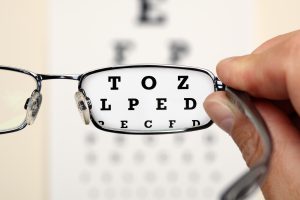The importance of regular eye examinations.

Regular eye examinations are an important part of a broader health regime but it is not only about how well you can see; an eye examination can pick up subtle changes that are related to a range of health issues and early identification could save your sight, or even your life.
What happens at an eye examination?
These assessments are performed by ophthalmologists or optometrists who look at the complete health of your eyes from front to back. At a routine eye examination, your practitioner will:
- Ask you about your eyes and vision and your general health
- Measure your ability to see at various distances (visual acuity)
- Check how well you see colour
- Monitor how your eyes react to light and movement
- Measure the pressure inside your eyes
- Examine the outer surface of your eyes with a powerful microscope (slit lamp).
The practitioner will also check for early signs of serious eye conditions such as: cataracts, glaucoma, macular degeneration, diabetic retinopathy, and detached retinas. While these conditions often have little to no symptoms, they are a serious threat to your vision. Fortunately, these conditions can be treated if they are caught early enough.
Aside from serious eye disease, an eye examination can also reveal other serious health problems such as: diabetes, high blood pressure or the risk of stroke. These conditions are discovered when the ophthalmologist examines the appearance of blood vessels and other structures within the eye. High cholesterol levels that lead to cardiovascular disease can also be seen during an eye exam, as can very rare cancerous growths in the eye, or even rarely reveal brain tumours.
How often should I have an examination?
The Eye Surgeons Foundation of Australia recommends that all adults should have a comprehensive eye examination at least every few years. People with diagnosed vision problems and disease of the eye should be tested more frequently, as recommended by your practitioner.
At what age should eye examinations start?
The first eight years of childhood are critical for eye development and it is important to have children’s eyes tested for any abnormalities. Some abnormalities—such as amblyopia (or “lazy eye”)—can only be corrected during childhood and can cause permanent vision damage if left untreated.
Children should have their eyes screened at birth and at regular intervals throughout infancy. This should be followed by regular checks during their school years. This is particularly important if there is a family history of childhood eye or vision problems or the child was born prematurely—these babies are at increased risk of eye problems and require examination by an ophthalmologist from an early age.
Teenagers put their eyes through a lot of strain with increased study loads and use of technology, which involves increased use of close vision. At this time, it is important to ensure that regular eye examinations continue to monitor the development of any visual problems and potential diseases.
Early adulthood is another time of change where increased study and employment workloads can have an effect on your vision, so it’s important to have your eyes tested regularly to monitor your vision and seek advice if you notice any changes.
Getting older
The incidence of eye health problems increases in people over the age of 40. At this age, problems can arise if there is:
- A family history of glaucoma or macular degeneration.
- Chronic systemic conditions such as diabetes or high blood pressure.
- Health conditions such as raised cholesterol, thyroid disorder, arthritis
It’s also at this age that people being to experience age-related vision depreciation so it’s crucial that all adults over the age of 40 have regular comprehensive eye examinations. These should be conducted at least every few years, even if there are no obvious problems apparent.
After the age of 65, eye disorders becomes more common, so it’s recommended that eye examinations are fulfilled every twelve to twenty four months. If the patient has developed glaucoma, macular degeneration, cataracts or any other eye disorder, visits may need to be more frequent. Keeping up eye health is critically important during senior years to ensure that vision loss doesn’t contribute to falls or a general decrease in the quality of life.
To find out more, call NewVision Clinics on 1800 24 66 68 to book a consultation at your nearest clinic.
Author bio
Susanna Smith is a writer and health communications professional who specialises in writing about health, travel and lifestyle.
